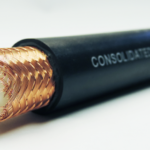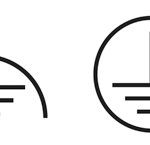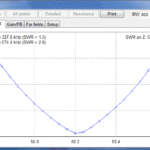By Chris White WX7V
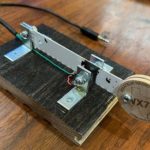
The “Cootie” key or “Sideswiper” is a double-sided straight key known for being difficult to master, but with some practice I’ve found it easier and more natural to use than paddles and an IAMBIC keyer. There are some nice professionally made cootie keys. I have the Titan made by W1SFR Steven Roberts, who is also one of the NCS for the Sideswiper Net. Begali, the “Ferrari” of morse code keys, has the Sculpture Swing which looks like a real work of art.
I was inspired to make my own after seeing pictures of homebrew keys made by members of the Straight Key Century Club. I’ve put together a few kits like the Kent Single Paddle Key which can be wired like a sideswiper (mine is). But the single paddle doesn’t have the same “swinging” feel that I love in a true cootie key.
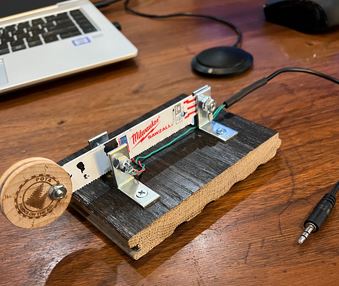
This my first, and very rough, attempt at a homebrew. You can make one for less than $5 at Home Depot depending on what you already have in your toolbox. I used a piece of composite wood flooring for the base (free sample), a packet of 1 inch L brackets, and a packet of 8-32 1/2 inch machine screws for the contacts. I used a Milwaukee Sawzall blade since it had the American Flag on the side. For the finger pieces I used some wooden buffalo nickels that I had ordered from ETSY to give out to family and friends. I completed the key with 4 rubber feet that are available in small packs on Amazon like these. The feet were added after the pics below were taken.
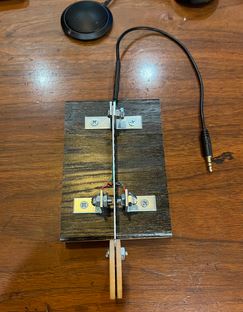
The contacts are wired with some 2-22 gauge solid copper telephone wire and soldered to an old 3.5MM TRS pigtail salvaged from the junk drawer. The rear contacts are soldered to both TIP and RING on the TRS connector, and the front contact is soldered to the sleeve (ground). Finally I added some heat shrink to neaten the connections and add some strain relief to the cable.
The home brew key feels great and works like a champ! Next time I’d probably use a nicer base, some knurled brass screws, and a hacksaw blade with 24 TPI (teeth per inch) for a smoother finish. While it won’t replace my TITAN, this is a fun project to show off to family and friends.



